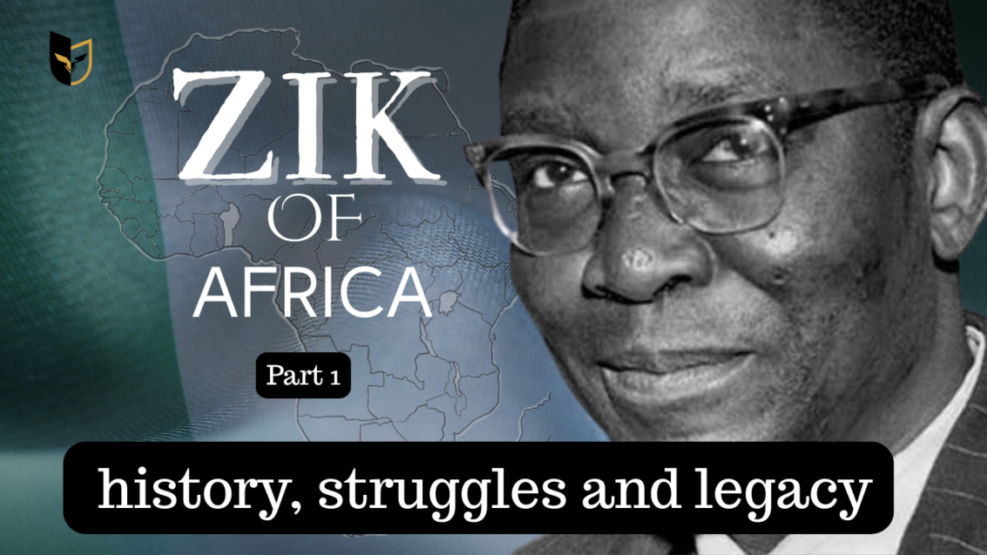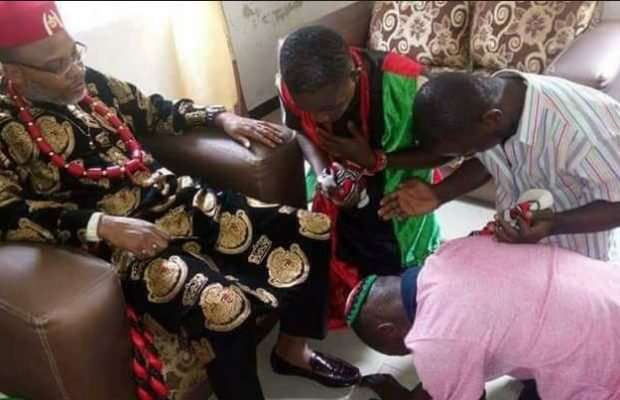No products in the cart.


A careful observation of what is happening in Igbo land will reveal a silent struggle for leadership and control. It is also a struggle between the elders and the youths.
When Mazi Nnamdi Kanu came up with the Indigenous People of Biafra (IPOB); a movement for the restoration of Biafra, (Republic of Biafra existed between May 1967-January 1970), it was with a buzz that attracted a lot of people; both old and young. It was refreshing that someone saw the weakness of the political elites in the fight for justice, equity and fairness on behalf of the Igbo in Nigeria. His voice reverberated not only within Nigeria but across the world. Then he was captured and jailed. The youths trooped out in protest of his capture with a demand of an unconditional release. The protests grew larger that the federal government resorted to wield the stick probably to scare them or to tell the people where they belong, after all, Biafra lost to Nigeria during the war. But the youths were unrelenting.
Nnamdi who was the Director of Radio Biafra and one of the directors of the IPOB at the time, was in the prison for nearly two years. Kanu assumed leadership of IPOB through Radio Biafra. His criticism against the Nigerian state and heroism handed to him by the insensitive, exclusion and vindictive policies of Buhari administration against the Igbo people in particular grew the mobilization capacity of IPOB which revolved around Kanu using the radio.
Biafra Day (May 30) is commemorated by many Igbo across the world in honour of the fallen Biafra War heroes and also against state injustice in Nigeria on Igbo people. In 2017, a sit at home was declared by the IPOB to mark the 50th anniversary of the defunct Republic of Biafra which was highly observed across the South East and other parts of the world. To some, Nnamdi became a hero and also taken to be the leader of the Biafran struggle. Likewise, IPOB was considered as a replacement of ‘lame’ Ohanaeze Ndigbo – the apex Igbo socio-cultural group.
Nnamdi was later sacked as the IPOB leader and director of Radio Biafra. The charges leading to his dismissal include among others; personalization of the Biafran struggle for vain glory, his decisions and actions to incite members of IPOB that leads to their death and abandonment of fellow detainees who were part of the struggle. However, in May 2017, a statement made by Nnamdi indicated organisational changes in IPOB.
Many Igbo people who welcomed what Nnamdi does, disagreed with him on strategy. Many thought the agitation could be used to bargain the political standing of Igbo people within Nigeria and not to separate, which irked the disciples of Nnamdi.
Eventually, Nnamdi was set free through the efforts of the political leaders especially the South East Senators who also jostled to identify with him. With the conditions set by the court, he did not ‘stoop to conquer’; he was then a king – evidenced by his dressing, red carpets laid for his feet and people kissing his feet. He was becoming a messiah. His followers were massive. He began to dish out orders including boycott of election in Anambra state, thereby assuming supreme leadership of Ndigbo. That was when many people began to look back and the political leaders needed to stop him. Federal government within the time had IPOB proscribed and attacked his home.
Many Igbo people were unhappy with such decision and the inaction of the political leaders over the proscription of IPOB did not sit well with the people. The hatred already instilled in the youths for these leaders by Nnamdi’s verbal abuses got hold of them. These leaders were seen as sabotaging the welfare of Igbo people and they cared less about assuaging and being proactive on the interest of the people. Nnamdi Kanu had become the messiah and was addressed as ‘Supreme Leader’.

The dichotomy between the socio-political leaders and the youths remain wide. The leaders are yet to redeem themselves and sow the seed of trust. Their actions are always viewed with suspicion. Their inactions have become a window to see their servitude to other powers than to Igbo people.
When the Fulani herdsmen began their mayhem and attacked some communities, the leaders adopted what I call ‘submissive appeasement’. Consequently, the governors, the Ohanaeze and other leaders are viewed as weaklings. People expect them to make proactive policies that protect the lives and properties of Igbo people against the invading herdsmen. The press releases they do have become very common as the people have become tired of them and view them with scorn.
The South West region organized and launched Amotekun whereas the South East leaders were sleeping on their hands. The leadership lapses again handed another opportunity to Nnamdi and IPOB to launch ESN (Eastern Security Network) whose objective is to take out the herdsmen from the farms and bushes.
The gathering of the South East leaders is always mocked and their decisions are scrutinized with harshness because, the resolutions always ended on the read-out of the communiqué. For instance, the establishment of Ebube Agu – the South East security outfit, was greeted with derision because the people envisage that the outfit may not be fully established. In fact, they were advised to adopt ESN. Yet, IPOB through the spokesman Emma Powerful issued a threat that no one should enlist in the Ebube Agu.
Nnamdi has shown he is ahead of the leaders even if it is for the camera and he does so from faraway London. His grip on the people and continued show of being proactive has crippled the leaders’ control. The recent eulogy by Fr. Ejike Mbaka has lifted him up the rungs of ladder of power. We must not forget that in Igbo culture the elders take prominent seats because they have bank of experience and wisdom. The elders must not run or shy away from leading their children and children should not wash their hands on the heads of the elders. These rules must not be sacrificed on the altar of politics.
The verbal abuses heaped on Igbo leaders by Nnamdi are not helping Ndigbo. If he does so in other to dominate and assume full power, when our leaders are thrashed in that way, outsiders will see them as nothing. If the leaders did not show weakness of leadership, Nnamdi will naturally submit to their guidance.
The end should be sought. Let the youths know their voice will be amplified better with the backing of the elders and the leaders should know that their voice is strengthened with the strength of the youths. There is need for common ground.
The leaders and the elders must show commitment and listen to the yearnings of the people. Decisions have to be taken in accordance to what the people want not what they want for the people. They should remember that political powers and the moral right to lead are derived from the consent of the people. When they show commitment to the people, the people will easily give them support.
A single person should not control a security outfit that will protect the whole region.
These are the effects of lack of bold and visionary leadership.
It’s only fair to share!… Subscribe on Telegram